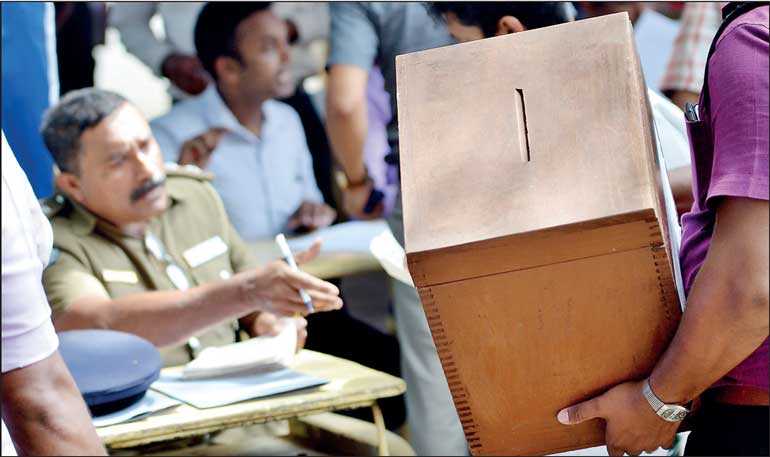Sunday Feb 15, 2026
Sunday Feb 15, 2026
Friday, 10 July 2020 00:15 - - {{hitsCtrl.values.hits}}

The Legislature, the Executive and the Judiciary can be considered the three main power centres in a democratic system of governance. The Legislature enacts laws and formulates policies while the  Executive functions as the agency that implements them. The Judiciary is assigned the responsibility to investigate whether the Legislature and the Executive discharge the duties and responsibilities assigned them, in compliance with the Constitution.
Executive functions as the agency that implements them. The Judiciary is assigned the responsibility to investigate whether the Legislature and the Executive discharge the duties and responsibilities assigned them, in compliance with the Constitution.
The classical liberal theorists are of the view that there ought to be adequate rules and regulations in place to make sure the division of power among the three power centres are maintained in such a manner that one centre would not be allowed to seize the control of any other centre or the both.
In a democratic State, it is from the people, not the God, that these three major power centres derive their authority. It is the people that constitute the source of sovereignty in a democratic system of governance. The public, in conformity with the constitution which is a contract they have entered into with the State, transfer its sovereignty to the Legislature, the centre of people’s representatives elected by their vote. The Executive and the Judiciary derive their statutory powers from the Legislature.
In the final analysis, all three power centres exercise the sovereignty of the people, which the latter has transferred to them, temporarily. The power conferred on all three centres should be exercised in conformity with the contract, which is the Constitution, entered into with the people. Therefore, violation of the Constitution should be regarded as a serious breach of trust and breach of contract.
The dilemmas of the system of governance
There is an obvious irregularity in the way these three power centres are built in the system of governance in Sri Lanka, which is contrary to democracy and the aspirations of the people. Apparently all three centres do not have a formal democratic perspective. Often they had acted undemocratically and failed to adopt a policy, just and equal for all citizens. They have shattered the nation and undermined national integration by pursuing policies based on ethnicity, caste and creed.
The policy adopted had been one that had violated the constitution, persistently rather than safeguarding it. There is no political culture in the country in which the violation of the Constitution is considered a serious offence. There is also no system of punishing those who violate the Constitution intentionally. One of the most pernicious characteristics of the Sri Lankan political system is that the Judiciary, the supposed sentinel angel of the Constitution itself, doesn’t seem to have any concern about it. Instead, it has adopted a policy that encourages those who violate the Constitution. The worst is that, in some instances, the Constitution has been violated by the Judiciary itself. The exploitation of public property by Presidents, the temporary custodian of them, in collaboration with their Ministers, MPs and State Officials of higher ranks has become a regular feature, a hallmark of State rule since 1978. Transacting business with the government by people’s representatives and State officials in a democratic system is usually considered a serious offence punishable by the wrongdoers being dismissed from office and even depriving them of their civic rights. Sri Lanka too, has stringent laws that prohibit people’s representatives and State officials transacting business with the government, but in practice they remain defunct as they are not enforced. This ugly situation can be considered a major factor that has led to corrupt not only the entire institutional system of the State, but also to plunge the country into a state of bankruptcy.
The chaos in the system of governance
Apparently, none of the programs launched to reform the system of governance so far, has not taken into account the shortcomings inherent in the constitution, described above. The establishment of Independent Commissions under the 19th Amendment to the Constitution envisaged minimising the politicisation of the affairs of the government. Sadly it has failed even to achieve this limited objective. None of the Constitutions adopted by the Parliament of Sri Lanka can be regarded as examples of ideal Constitutions that would guarantee an effective democratic rule. The present Constitution (a) has not been able to establish or maintain harmony and national integration; (b) It has not been able to prevent violations of the Constitution; (c) It has failed to prevent people’s representatives from stealing public property in their temporary custody and to ensure an effective rule free of corruption and violence.
Overcoming challenges
The people›s representatives and the Legislative Council consisting of them are responsible for the catastrophic collapse and decline of the State of Sri Lanka. They did not respect the Constitution; they vandalised it and robbed public property which was under their custody. A group of such people has no right or ability to recreate the system. Therefore, a framework that passes the overall responsibility of recreating the State and the political system to the people themselves, who can be considered the rightful owners of sovereignty, must be established. However, it doesn’t imply that the people’s representatives should be excluded from this process completely. But, it must be the people who should play the major role of leadership in the recreating program. The plan adopted for the proposed recreating program should be one that is formulated by people themselves; the system of governance envisaged to be established must be one that gives more weight to the interests of the people. And the Constitution drafted for building the new system of governance must be a people’s Constitution.
It would be possible to enable the public and grant them power to intervene actively in the formulation of laws and policies and exercise their sovereignty, by introducing direct democratic measures in to the constitution, such as the system of ‘Citizens’ Initiative,’ alternate referendum, recalling people’s representatives before the end of their term, found in the Constitution of Switzerland. The Citizens’ Initiative is a methodology that allows the public to submit proposals for changes they wish to have implemented. It could be a proposal for a new legislation or formulation of a new policy. Or it could be a motion against a corrupt official. If the proposal is submitted with the required number of signatures, the Legislature is obliged to include it in the agenda.
If the Legislature accepts the proposal, the group of people who submitted it must renounce the ownership of it so that the Legislature will submit it as one of its own proposals for consideration and implement it upon approval. If the Legislature refuses to accept the proposal, it must be debated and subjected to a vote by the Legislature. If it is defeated it should be referred to a national referendum.
Open the doors for a transformation
It is only the right to vote in elections that the people have gained under the representative democratic system practiced in Sri Lanka. The public does not have any authority to intervene in the cases of serious offences committed by the Legislature, the Executive, or the Judiciary which none of these institutions are interested in rectifying.
Under the circumstances, it would be possible to make the public an important and powerful stakeholder of the governance process by granting them the power by way of the system of Citizens Initiative, practiced in Switzerland, to submit proposals to the Legislature against corrupt officials who are seriously engaged in violating laws and jeopardising the policy-making process. This alone will help transform the State into an entity which is under close surveillance of the public and free of corruption, people friendly and efficient. A special clause must be incorporated in the constitution, thus making the active involvement of officers in Constitutional violations, a grave offence punishable by deprivation of positions and the civic rights of those engaged in such violations. This principle must equally be applicable to the judges of the higher Courts as well. The provisions needed for abolition of recognition accorded to the caste system in toto, should be included in the Constitution. A clear interpretation on ethnic and religious composition of the Sri Lankan nation should be included in the Constitution itself. Persecution of people on the basis of ethnic, religious and caste divisions should be declared a violation of the Constitution and provisions included in the Constitution to punish those violating it. Introducing a framework that grants people the right to intervene effectively in important matters of legislation, policy making and governance will inevitably lead to a revolutionary transformation of the entire system of governance. There is hardly any rectification of serious errors in the present system. The Parliamentary authorities are well aware of the fact that the MPs, in violation of the law, are openly engaged in transacting business with the Government. The Parliament was not oblivious of corrupt Presidents.
Chief Justice Sarath Silva ruined the judiciary to the hilt. Yet he is having a peaceful life of retirement without any problem. This vicious cycle can be reversed only by creating a formal and effective system that gives the people the right to actively intervene in the process of governance.
Conclusion
Introducing a ‘Popular Initiative System’ will empower the public to eradicate corruption, inefficiency and sadism or enjoyment of cruelty to others which can be regarded as the three deadliest forms of cancer that the state and its institutions have been enveloped and entwined. It is the public who has the true potential to do that. Thereafter, the oppression of people on ethnic, caste and religious differences, violation of human rights and violation of the Constitution will become unpleasant and ugly reminiscences of the past. All kinds of voiceless people will be able to have their voice heard on the national stage.
The public will gain power to propose necessary reforms in the spheres of education, public health, transportation, environment and energy, industries, trade, small industries, handicraft, fisheries, commercial agriculture and rural agriculture, etc., and have them legalised. The need for going on strike to win the rights of the wage earners might not arise as the workers will be able to resolve their problems by adopting the people’s initiative system.
It is not a utopian dream, but a dream that can be realised. Sri Lanka, which is on the brink of a major catastrophe, could be turned into a shining example of esteem and emulation, by opening the doors for the people and giving them the power to make a people’s constitution that would empower the public to recreate Sri Lanka. It is not a system to be experimented with. It is a proven system that had been implemented by several countries which had encountered a similar situation like Sri Lanka and achieved successful results.